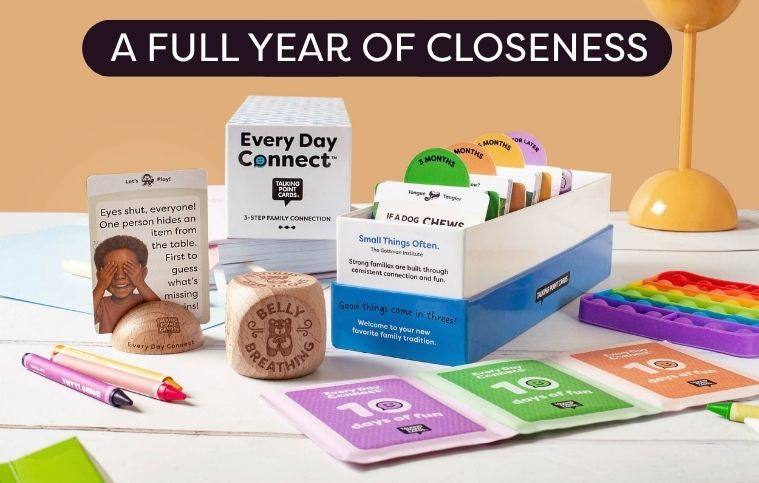SHOP
About
The Problem With Playing It Safe
The Night Everything Changed
What Happened Next Surprised Everyone
The Cards That Started It All
The Ripple Effect
What I Learned About Creating Safe Spaces
Beyond The Right Answers
When Faith Gets Real
What I'd Tell My Past Self
The Invitation To Go Deeper
Shop
Let me paint you a picture of what our small group looked like before. Eight people, sitting in a circle in my living room every Wednesday. We'd dive into our study guide, someone would read the passage, and then... crickets.
Well, not complete silence. There were answers. Lots of them. But they were the kind of answers that felt safe. You know the ones I'm talking about. "God is good." "We should trust in Him." "Prayer changes things." All true, but somehow they left me feeling like we were skating on the surface of something much deeper.
I remember sitting there one evening, watching Sarah nod politely while Jessica shared another "right" answer, and thinking: We've been meeting for two years. These people are incredible. So why do I feel like I barely know them?
That's when I realized we weren't having conversations about faith. We were having performances.
The Problem With Playing It Safe
Here's what I've learned about faith discussions in small groups: we're all terrified of saying the wrong thing. We've gotten so good at giving the "Sunday school answers" that we've forgotten how to be real with each other.
And honestly? I don't blame us. Church can feel like a place where vulnerability is risky.
Where admitting you have doubts means you're not faithful enough. Where sharing your struggles feels like you're letting the team down.
But what if that's exactly backwards? What if the most faithful thing we can do is be honest about our mess?
The Night Everything Changed
It was a Wednesday in October when I decided to try something different. Instead of opening our study guide, I pulled out this deck of cards I'd created. Simple conversation starters, but specifically designed for faith discussions.
"Let's try something new tonight," I said, shuffling the deck. "No study guide. No right answers. Just... conversation."
The first card I drew was: "How has your faith impacted your day-to-day life?"
I watched as everyone shifted in their seats. This wasn't a question you could answer with a memorized verse. This required vulnerability.
Sarah spoke first. And instead of giving her usual perfect answer, she said something that changed everything: "Honestly? Some days I'm not sure it does. Like, I pray and read my Bible, but then I still lose my temper with my kids and feel guilty about it. Sometimes I wonder if I'm doing this whole faith thing wrong."
The room went quiet. But it wasn't the uncomfortable silence we were used to. It was the kind of quiet that happens when someone finally tells the truth.
What Happened Next Surprised Everyone
That night, we talked for two hours. TWO HOURS. About real faith. About doubt and certainty and everything in between.
Jessica shared how she'd been questioning whether all of the Bible still applies today – something she'd never dared to voice before. Jeff opened up about his struggles with prayer, admitting she sometimes felt like he was talking to the ceiling. And Linda? Linda told us about a season of her life where she'd been angry at God, and how that anger had actually deepened her faith in the end.
For the first time in two years, I felt like I was seeing my friends. Not their Sunday best, but their actual, beautiful, messy selves.
The Cards That Started It All
What made these cards different from our usual study questions? They weren't asking us to analyze a passage or recall a Bible fact. They were asking us to connect our faith to our actual lives.
Questions like:
-
"What do you imagine the church will be like 100 years from now?"
-
"What do you think are the consequences of Christians not practicing what they preach?"
-
"What is your belief about how the world came into being?"
These weren't questions with obvious "right" answers. They were invitations to share what we actually thought, felt, and believed.

Rated #1 Christian Product
Deepen faith, strengthen fellowship, and spark meaningful conversations in families, small groups, and beyond.

The Ripple Effect of Authentic Conversation
Six months later, our Wednesday night group is unrecognizable. Not because we changed the format completely – we still do Bible study. But now we have a foundation of trust that makes everything deeper.
When we read about Peter denying Jesus, Sarah doesn't just talk about Peter's failure.
She talks about her own moments of spiritual cowardice. When we study the Psalms,
Maria shares what it's like to pray when you're depressed. When we discuss Jesus's parables, Allan asks the hard questions about interpretation that she used to keep to herself.
The conversations don't stay in my living room either. These people text each other throughout the week. They've started meeting for coffee to continue discussions. They're having real conversations with their families about faith.
What I Learned About Creating Safe Spaces
Looking back, I realize the cards weren't magic. They were just a tool that helped us do something we all desperately wanted to do but didn't know how to start: be real with each other.
Here's what I've learned about creating space for authentic faith conversations:
Permission to be human matters more than having the right answers. When we started treating doubt as part of faith instead of the enemy of it, everything changed.
Questions are often more powerful than statements. Instead of telling people what to believe, asking them what they think creates space for genuine exploration.
Vulnerability is contagious. When one person shares authentically, it gives everyone else permission to do the same.
Small groups don't need to be therapy sessions, but they do need to be real. There's a difference between oversharing and honest sharing. We learned to navigate that together.
Beyond the Right Answers
I used to think my job as a small group leader was to have all the answers. To guide discussions toward neat conclusions. To make sure everyone left feeling spiritually satisfied.
But I've learned that sometimes the most spiritual thing we can do is sit with the questions. To create space for mystery. To acknowledge that faith is a journey, not a destination.
These conversation cards didn't give us answers. They gave us something better: they gave us each other. Really, truly each other.
The Transformation I Didn't See Coming
The biggest surprise hasn't been how the group changed – though that's been beautiful. It's been how I've changed as a leader.
I used to prepare for our meetings by studying the passage until I could answer any question. Now I prepare by thinking about how to create space for honesty. I've traded my need to be the expert for the joy of being a fellow traveler.
And you know what? I'm a better leader for it. Not because I have more answers, but because I've learned to ask better questions.
When Faith Gets Real
There's a verse that keeps coming back to me: "Iron sharpens iron, and one person sharpens another." For years, I thought that meant we should challenge each other's theology. But I'm learning it means something much deeper.
We sharpen each other by being real. By sharing our struggles alongside our victories. By admitting when we don't understand. By asking the questions that don't have easy answers.
That's what these conversation cards gave us: permission to be iron sharpening iron instead of plastic bumping against plastic.
What I'd Tell My Past Self
If I could go back and tell myself something six months ago, it would be this: your people are hungry for real conversation about faith. They're tired of performing. They want to connect, not just over what they believe, but over how they live it out.
The cards were just the beginning. The real magic happened when we decided to show up as ourselves – questions, doubts, struggles, and all.
The Invitation to Go Deeper
I think about that first night a lot. How nervous I was to try something different. How worried I was that it wouldn't work, that we'd sit in awkward silence, that people would think I was a bad leader for not having a lesson plan.
But what if the lesson plan was learning to be human together? What if the goal wasn't to finish a study but to know each other better? What if the point wasn't to have all the answers but to explore the questions together?
These days, our Wednesday nights still start with a card. But now, we all know the real conversation is just beginning. And that's exactly where we want to be – not at the end of neat conclusions, but in the beautiful mess of authentic faith shared with people who've become family.
Sometimes the most profound spiritual growth happens not when we have all the answers, but when we're finally brave enough to voice the questions that matter most.
And sometimes, all it takes is a simple card to get the conversation started.
At Talking Point Cards, we believe that faith and fellowship grow deeper through open, honest conversations. Our carefully designed prompts help individuals, families, and groups explore life, purpose, and belief together - creating space for reflection, connection, and shared understanding. Because the most meaningful spiritual journeys are walked side by side, one conversation at a time.
Let's Stay Connected
Love what you’re reading? There’s more where that came from. Get fresh ideas, inspiring tips, and simple ways to spark deeper conversations - delivered straight to your inbox. Because the best connections start here. Just pop in your email below to join us.
We respect your privacy. We’ll never share or sell your information. By subscribing, you agree to receive emails from us. Unsubscribe anytime.












